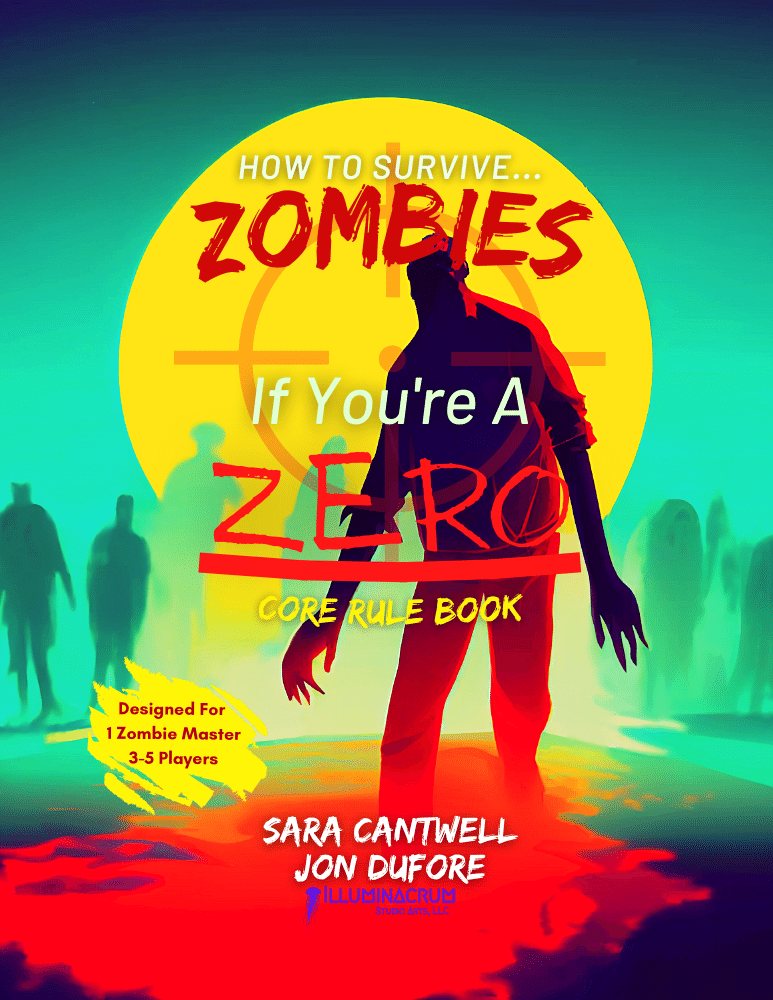Some folks want to be Rick Grimes, blasting through the apocalypse, like a crazed bad-ass. Others want pile of body armor, weapons, so zombies are a mere complication.
But what about everyone trying to survive who don't necessarily have elite wits, wherewithal, and bags of holding containing arsenals with unlimited.
In How to Survive Zombies If You're a Zero , you are playing fairly common folk, the "Zeros," using their own limited skills, and those of the folks they're forced to trust to get through day to day living.
My first read-through gave me a very classic Cthulhu vibe. The characters are normal people with nothing more than a fleeting above-average talent or equipment. Most of the secrets man was not meant to know (i.e. zombie origin or cure) will always be out of their purview. Rather, they are trying to survive, and if they die, their hopefully sacrificing themselves to a greater good for their friends and family, or perhaps for a different group that will never know the true cost.
Being A Zero: I had to chuckle when in the first sentence of character creation mentions the only significant decisions a player needs to make is the character's "flavor". We don't want the zeds suffering from a bland palette, do we?
There are seven different stats, Smarts, Judgement, Attention, Force, Nimble, Speed, and Resilience. Not only are they used for different survival techniques, but they influence weapons and attacks!
The book does nice job keeping some role-playing essentials for first time players, or first time players in the zombie genre. Is the character elusive, or wants to bash zombie skulls directly? What personality or though process is this person going through during the apocalypse, as well as a yet another reminder that the characters are not heroes, that can (and probably will) die, and it will take teamwork and adapting to even have a chance for survival.
Builds: Thirteen character builds are provided to differentiate your characters. Medics, Planners, Survivors, and Skirmishers provided suggested weapons, as well as potential WITs (What it Takes) which will improve the character. Some are situational bonuses to stats, or action checks, while others outright augment or change the rules. Perhaps the only pages that were a bit overwhelming are the lists of nothing but potential WITs, with the caveat that, with experience, you can add your own WITS, using the guidance provided in the book.
The System: The resolution system "Lumin d10 Tabletop RPG System/Zero System" In this world where PCs are Zeros, unmodified checks start with a 50/50 chance of success... or failure. Diving deeper into results, the lower the result, the worse things turn out, starting with a basic failure to a 1 or below, where Grim Consequence guarantee that things go from bad to horribly worse.
Conversely the higher the roll, the luckier the group gets, with helpful breaks to incredibly lucky results. Marginal rolls (4-5) can also become basic successes, but "At a Cost." This ranges from wounds, fatigue, all the way from bleak complications to possible zombie infection!
Really, the system is diverse enough that I could whip out a few zeros and try out things, but it correctly delves into more rules, covering initiative and movement (speed checks) and combat. One thing I love that adds to the Zero concept: NPCs (usually zombies) win ties with PCs.
Finally conditions are detailed, Toughness, Fatigue, Hunger & Thirst, Infection, and Resting are all real issues in the apocalypse
Survival Gear: I realized quickly that MacGuyver was not a Zero in the apocalypse. True equipment is listed, but it is becoming scarcer each day, so a reliance on crafted equipment is an indispensable tool. Crafted weapons, equipment, first aid, and armor are covered. Scavenging items is also listed, including vehicles, drugs, and questionable food. (If the zombies don't kill you, bad food prep might kill everyone).
World Building: While there are samples in the book, it's up to the Zombie Master to collaborate with his group to build out a background for the game, as well as drawing lines. A lot of games have ham-fisted safety tools into games that make some as uncomfortable with the idea as what the tools are trying to avoid. This game does an excellent job inserting these concepts in multiple places, to make it seem cohesive to a new gamer, but present it to experienced gamers as "You usually do this unconsciously to your players, don't be jerk in a game with death, brains, and possibly a metric crap-ton of gore." It's simple: What is open and on the table, what topics should be dealt with gently, and what items need a minimal detail, an outright fade to black, or avoidance in the game from the beginning.
The book does a good job detailing how to set-up a long running game into the apocalypse. From a constant fight for survival against zombies, then the hordes, then the survivors, until communities can be built and the threats scaled accordingly.
Finally, there's the zombies! From zombie grunts to more elaborate kin, the focus is merging environment with quality and variety, for a challenging scenario.
Ranger Station Reprieve is an introductory scenario for three hours. The 25-pages cover the backstory, pre-gen PCs, and maps of the ranger station.
The Appendix is a handy spot to collect all the zombie types (24!), the templates for characters, and another listing the pseudo-daunting WITS for character improvement.
I give How to Survive Zombies If You're a Zero four and a half gnomes out of five on the Gaming with the Gnomies Five-Gnome System. This has been added to my short list of RPGs to get on the table whenever we have some face-to-face time.
 |
| Znombies Ate the Half Gnome.... |

No comments:
Post a Comment